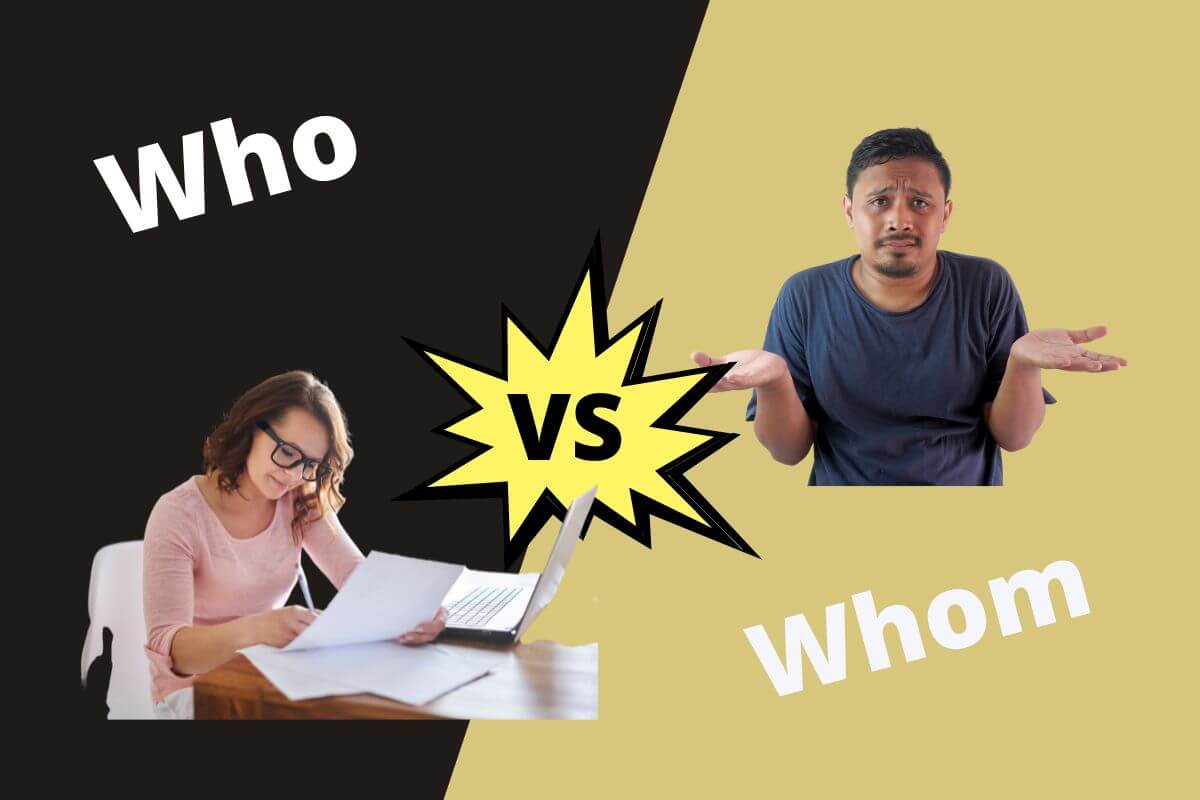The main difference between who and whom is that who functions as a subject, while whom is an object in a sentence. In other words, who does the action and whom receives the action.
When it comes to who is better than whom, many English grammar learners are unsure. While who and whom are interrogative pronouns, there is a variation in how you can use them.
| Who | vs. | Whom |
| Used to inquire about which individual or persons, rather than about things or objects, i.e., to learn more about the verb’s subject. | Meaning | Whom is essentially just the objective version of the term “who,” often employed in formal contexts as the verb’s object. It identifies who is getting the action. |
| You can use who in place of the topic of an inquiry since it is an inquiring pronoun. | When To Use | Using whom is undoubtedly more demanding than using the word who. Whom is a term that you act upon, as opposed to who. |
| It is a subjective pronoun. | Rule of grammar | It is an objective pronoun. |
| Who owns this house? | Example | This house is owned by whom? |
Table of Contents
Difference Between Who and Whom
If you’re someone who often wonders whether to use who or whom in a particular situation, here are all the differences you must know to find out the right word:
Meaning
Who
In English, people utilize the term who to inquire about which individual or persons, rather than about things or objects, i.e., to learn more about the verb’s subject. The term subject means the individual or thing that acts, making the subject of a sentence the action’s doer.
You may use who in place of the topic of an inquiry since it is an inquiring pronoun.
Examples: Who is leaving? Who are you? Are you the one who asked?
Also, you may even use who in explanations in place of the clause’s topic.
Examples: I was informed by this person. The individual who wishes to sing is Joe. Anyone who is aware of the real story, please notify us.
Whom
Whom is the objective case of the term who. It’s often used in formal writing as the verb’s object. It identifies who is getting the action of the verb.
Whom is an inquiring pronoun used in place of the question’s target.
Example: Whom is the subject of this book? Whom are you staying with? Whom did you inform?

When to Use
Who
Use who when it’s the subject of a sentence because it takes action. It’s similar to the words they, us, she, and he.
Example: Who is chatting on the phone?
If you’d say the phrase, “the automobile is driven to home by who,” it’d be inaccurate because the object, which should be whom, receives the verb.
Whom
Using the whom requires more understanding of English than using the word who. Whom is a term that you act upon, as opposed to who. The term whom also relates to the words them, us, her, and him.
Example: The assignment was done by whom?
We wouldn’t say, “Whom ate my burger?” We would use the word who because it performs the action.
Rules of Grammar
When to utilize who and whom depends on a few grammatical rules.
Subjects and Objects
- Who is a subjective pronoun, whereas whom is an objective pronoun. Simply said, this means that who is always the subject of a verb and whom is always the object of a verb.
- The subjective pronoun who identifies the person who does an activity.
Example: “That’s the girl who scored the goal” is an example of the same. Because the female was performing the scoring, it is the topic of “scored.”
The action is thus directed toward whom, the objective pronoun.
Example: Whom, for instance, do you like the most?
- Whom serves as the object of like.

More Examples of Who vs. Whom
Who
The fundamental distinction between who and whom is that who is only appropriate for use with the focus of any sentence. For instance, “My best friend Anna attends school.”
You may then rephrase the statement as an interrogative using the word who, with the subject of the sentence being Anna. Anna would be the response to the question, “Who goes to school?”
Whom
In contrast, the word whom is used as the target or receiver of a verb or verb phrase. For instance, “Anna spotted him on the train.”
When you add the word whom, it becomes, “She saw whom on the train?”
In most settings, you can get away with using who and whom interchangeably. However, it’s best to use them the right way, especially in a formal setting.
If you’ve enjoyed this post, check out our article on the difference between lose and loose.

